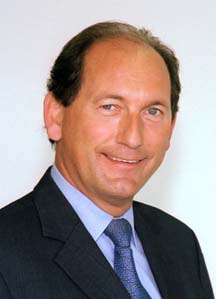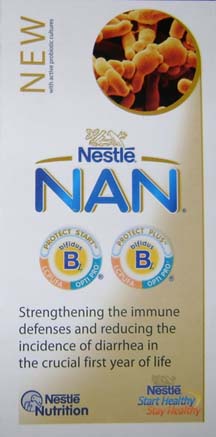 Mr. Paul Bulcke (left), CEO of Nestlé SA, and his predecessor and current Nestlé Chairman, Peter Brabeck-Letmathé, are seeking to set the agenda at the World Economic Forum in Davos, Swizerland this week. Nestlé is 'widely boycotted' in the words of its Global Public Affairs Manager, due to its aggressive marketing of baby foods in breach of international standards. Given the documentary evidence of systematic violations of the marketing requirements and the strategies employed by Mr. Bulcke and Mr Brabeck as they put their own profits before the lives and well-being of babies and their families, Baby Milk Action says it is ironic that Mr. Bulcke, co-chair of the meeting, believes he has any credibility in calling for "new global principles to fuel development". Mr. Bulcke, who was appointed CEO after achieving high growth in the baby food sector in Latin America, states in a press release on the Nestlé site: "When run in a principled way, with strong values and a long-term perspective, business can be an engine for development and prosperity."
Mr. Paul Bulcke (left), CEO of Nestlé SA, and his predecessor and current Nestlé Chairman, Peter Brabeck-Letmathé, are seeking to set the agenda at the World Economic Forum in Davos, Swizerland this week. Nestlé is 'widely boycotted' in the words of its Global Public Affairs Manager, due to its aggressive marketing of baby foods in breach of international standards. Given the documentary evidence of systematic violations of the marketing requirements and the strategies employed by Mr. Bulcke and Mr Brabeck as they put their own profits before the lives and well-being of babies and their families, Baby Milk Action says it is ironic that Mr. Bulcke, co-chair of the meeting, believes he has any credibility in calling for "new global principles to fuel development". Mr. Bulcke, who was appointed CEO after achieving high growth in the baby food sector in Latin America, states in a press release on the Nestlé site: "When run in a principled way, with strong values and a long-term perspective, business can be an engine for development and prosperity."
Mike Brady, Campaigns and Networking Coordinator at Baby Milk Action, said, "Mr. Bulcke and Mr. Brabeck have demonstrated the only principle they seem to understand is money - that is why we call on people around the world to join the boycott until they agree to stop pushing baby foods in ways that undermine breastfeeding and endanger babies fed on formula. The boycott has forced some changes, but they still have a long way to go. Mr. Bulcke is trying to present himself as a principled business leader on the global stage as part of his strategy to divert attention from what Nestlé's does in reality."
Both Mr. Bulcke and Mr. Brabeck have rejected Baby Milk Action's four-point plan for saving infant lives and ultimately ending the boycott.
Mr. Bulcke's comments come as thousands of people have emailed the company over its latest baby milk marketing strategy, calling on it to stop violating international marketing standards. In other areas of concern, the India media has this week exposed a secret deal between Nestlé and universities to target young girls with information on nutrition - a request for information on the deal under India's Right to Information law was blocked by Nestlé (see Times of India). While attempting to set the global agenda, Nestlé is also the subject of complaints for violations of the UN Global Compact Principles registered Baby Milk Action and other Nestlé Critics. The UN Global Compact Office has refused to investigate the complaints, but continues to accept funding from Nestlé for its events and posts Nestlé's criticised reports on its website.
Mike Brady, Campaigns and Networking Coordinator at Baby Milk Action, said:
"Nestlé current global baby milk marketing strategy involves promoting its formula with the claim it 'protects' babies, when in reality babies fed on formula are more likely to become sick than breastfed babies and, in conditions of poverty, more likely to die. I have written directly to Mr. Bulcke on this matter and he refuses to stop what is a clear violation of international marketing standards."
 In its latest communication on the 'protect' logos added to formula labels in 120 countries, Nestlé has admitted that there is 'no proven benefit' from adding to formula ingredients such as DHA and ARA highlighted in the logos, but is still refusing to remove the logos. After receiving thousands of emails in Baby Milk Action's Email Nestlé campaign, Nestlé has said it has discontinued a leaflet promoting its formula as 'The new "Gold Standards" in infant nutrition', but not other leaflets claiming, for example, that its formula reduces the incidence of diarrhoea. Babies fed on formula rather than breastfed are more likely to suffer from diarrhoea. According to WHO, "infants who are not breastfed in the first month of life may be as much as 25 times more likely to die than infants who are exclusively breastfed."
In its latest communication on the 'protect' logos added to formula labels in 120 countries, Nestlé has admitted that there is 'no proven benefit' from adding to formula ingredients such as DHA and ARA highlighted in the logos, but is still refusing to remove the logos. After receiving thousands of emails in Baby Milk Action's Email Nestlé campaign, Nestlé has said it has discontinued a leaflet promoting its formula as 'The new "Gold Standards" in infant nutrition', but not other leaflets claiming, for example, that its formula reduces the incidence of diarrhoea. Babies fed on formula rather than breastfed are more likely to suffer from diarrhoea. According to WHO, "infants who are not breastfed in the first month of life may be as much as 25 times more likely to die than infants who are exclusively breastfed."
According to UNICEF: "Marketing practices that undermine breastfeeding are potentially hazardous wherever they are pursued: in the developing world, WHO estimates that some 1.5 million children die each year because they are not adequately breastfed. These facts are not in dispute."
Nestlé is also refusing to warn on labels that powdered infant formula is not sterile and the simple steps required to reduce the risks of possible contamination with harmful bacteria. Nestlé has had to recall formula in the past after contamination with Enterobacter Sakazakii, which has led to deaths in Europe (see WHO publication on this known problem).
Nestlé is not only criticised for violating the International Code of Marketing of Breastmilk Substitutes and subsequent, relevant Resolutions. Campaigners monitoring other aspects of its business criticise the company for:
* trade union busting and failing to act on related court decisions;
* failure to act on child labour and slavery in its cocoa supply chain;
* exploitation of farmers, particularly in the dairy and coffee sectors;
* environmental degradation, particularly of water resources;
Click here for the report: Nestlé's UN Global Compact cover up - How Nestlé’s Shared Value reports cover up malpractice and bring the UN voluntary initiative for corporate responsibility into disrepute.














No comments:
Post a Comment